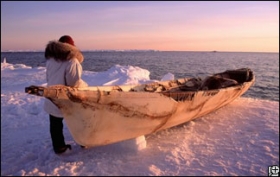For Alaska's Inupiat, Climate Change and Culture Shock
For the Inupiat people of northern Alaska, whales are a way of life.
These people eat the animals. They worship them. They organize their
calendars around them. And on and on. It's been that way for thousands of
years.
Now, however, climate change is pushing the whales further north, making it
harder for the Inupiat to catch them. That environmental shift is
threatening the culture's fundamental roots.
"If you have to pick one animal that is an icon of their traditional unity
and identity, it's got to be the whale," said Chie Sakakibara, a cultural
geographer at The Earth Institute at Columbia University in New York. "Their
identity is synonymous with the whales."
 |
And yet, these "people of the whales" are working hard to adapt to a changing world, said Sakakibara, who has spent five years documenting the Inupiats' efforts to cope. |
And yet, these "people of the whales" are working hard to adapt to a changing world, said Sakakibara, who has spent five years documenting the Inupiats' efforts to cope.
In particular, warmer water temperatures have pushed the animals further
north. Thinning sea ice has made camping for the hunt more dangerous. And
coastal erosion has pushed Inupiat communities further inland. These changes
and others have made whaling more and more challenging.
The good news, Sakakibara's research shows, is the Inupiat are working hard
to cope with their rapidly changing world. They are adapting traditional
stories, changing the timing of their drumming and dancing rituals (by using
music to bring the whales to them instead of making music to celebrate a
catch), and strengthening their appeals to the spirit of the whales.
The Inupiat are also adopting new technologies, such as outboard motors.
They have traditionally chased whales in wooden boats that are coated in
whale oil and driven by oars and lots of hard work.
"Because of where they live, they're used to coping with change and
environmental danger," said Robert Rundstrom, who teaches geography and
Native American studies at the University of Oklahoma in Norman. "So they
might provide insight into how humans are capable of adapting."
And even the Arctic is changing more quickly than other areas, the Inupiat
may have lessons that extend beyond their whale-centered lives.
"It's both a very focused study on a people and their relationship to
whales, but it also has implications for how we understand human-wildlife
relationships in drastically changing situations all over the world,"
Rundstrom told Discovery News. "In mainstream society, we think of ourselves
as being very distinct from animals. There's them and there's us...For the
Inupiat, for 2,000 years, it's been a wholly different ballgame."
Copyright © 2009 Discovery Communications, LLC. The number-one nonfiction media company.
To subscribe or visit go to: http://dsc.discovery.com